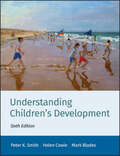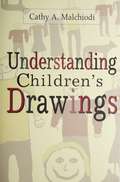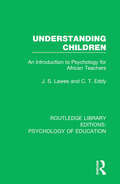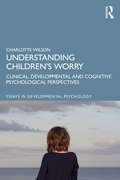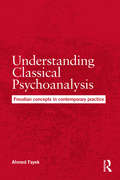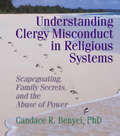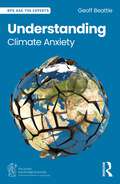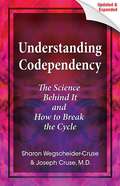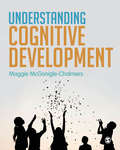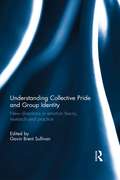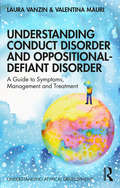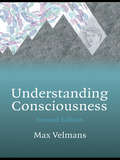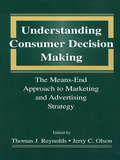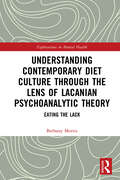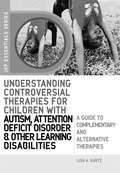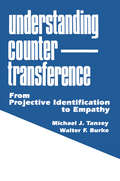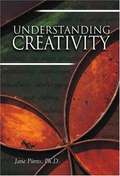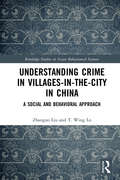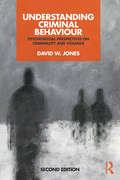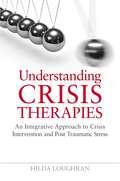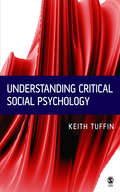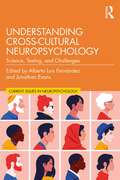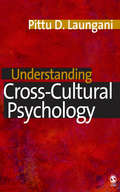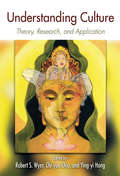- Table View
- List View
Understanding Children's Development (Basic Psychology)
by Peter K. Smith Helen Cowie Mark BladesUnderstanding Children's Development is the UK's best-selling developmental psychology textbook and has been widely acclaimed for its international coverage and rigorous research-based approach. <p><p> This dynamic text emphasizes the practical and applied implications of developmental research. It begins by introducing the ways in which psychologists study developmental processes before going on to consider all major aspects of development from conception through to adolescence.
Understanding Children's Drawings
by Cathy A. MalchiodiThis practical resource demonstrates how all clinicians can broaden and enhance their work with children by integrating drawing into therapy. The book enables therapists to address the multidimensional aspects of children's art without resorting to simplistic explanations. Approaching drawing as a springboard for communication and change, Malchiodi offers a wealth of guidelines for understanding the intricate messages embedded in children's drawings and in the art-making process itself. Topics covered include how to assist children in making art, what questions to ask and when, and how to motivate children who are initially resistant to drawing. Assimilating extensive research and clinical experience, the book includes over 100 examples of children's work.
Understanding Children: An Introduction to Psychology for African Teachers (Routledge Library Editions: Psychology of Education)
by J.S. Lawes C.T. EddyOriginally published in 1966, the two authors combined skill in their subject with experience of teaching it to students in Africa and elsewhere. Their aim was threefold. First and most important to emphasise to teachers in training how essential it is to regard children as individuals, each with a character and problems resulting from heredity and environment. Secondly, to give the teacher enough knowledge of psychology to help him to understand each pupil’s learning process and behaviour. Thirdly, to stimulate the teacher to observation, enquiry and thought. Each chapter ends with suggested exercises, discussion points and reading references. The book was one of a series offered to Africa teachers in training. The series was designed to help those who were called upon to teach the many subjects of the primary school curriculum or two or more subjects with junior forms of secondary schools. It was dedicated to the proposition that giving a good basic education to a country’s children is vital to its development programme.
Understanding Children’s Worry: Clinical, Developmental and Cognitive Psychological Perspectives (Essays in Developmental Psychology)
by Charlotte WilsonThis accessible guide offers a concise introduction to the science behind worry in children, summarising research from across psychology to explore the role of worry in a range of circumstances, from everyday worries to those that can seriously impact children’s lives. Wilson draws on theories from clinical, developmental and cognitive psychology to explain how children’s worry is influenced by both developmental and systemic factors, examining the processes involved in pathological worry in a range of childhood anxiety disorders. Covering topics including different definitions of worry, the influence of children’s development on worry, Generalised Anxiety Disorder (GAD) in children, and the role parents play in children’s worry, this book offers a new model of worry in children with important implications for prevention and intervention strategies. Understanding Children’s Worry is valuable reading for students in clinical, educational and developmental psychology, and professionals in child mental health.
Understanding Classical Psychoanalysis: Freudian concepts in contemporary practice
by Ahmed FayekUnderstanding Classical Psychoanalysis gives a clear overview of the key tenets of classical Freudian psychoanalysis, and offers a guide to how these might be best understood and applied to contemporary psychoanalytic theory and practice. Covering such essential concepts as the Oedipal complex, narcissism and metapsychology, Fayek explores what Freud’s thinking has to offer psychoanalysts of all schools of thought today, and what key facets of his work can usefully be built on to develop future theory. The book will be of interest to psychoanalysts and psychoanalytic psychotherapists in practice and training, as well as teaching faculties and postgraduate students studying Freudian psychoanalysis.
Understanding Clergy Misconduct in Religious Systems: Scapegoating, Family Secrets, and the Abuse of Power
by Candace R. BenyeiIn Understanding Clergy Misconduct in Religious Systems, you’ll take an incisive look at why sexual misconduct occurs in religious systems and how to implement proactive strategies for holistic change. Applicable to both Jewish and Christian communities, this illuminating exploration takes a look at the psychology behind scapegoating, why it is perpetuated, and how you can quell the damaging tradition of silence.Understanding Clergy Misconduct in Religious Systems helps you see leaders of religious institutions in a way that the world has been afraid to see them--in a glass clearly. Enriched with metaphoric myths and fairy tales instead of technical jargon, its unique systemic perspective reveals the psychodynamics behind the obsession with family secrets and lets you understand this dysfunction from the perspectives of victim, abuser, and counselor. These specific areas will both inform and aid you in dealing with this difficult subject: the religious institution as a family system the religious system as an illusion of the perfect family the concept of God-transference and the overidealization of clergy clergy personal relationships and clergy congregational relationships vulnerability and the psychology of the victim strategies for healing dysfunctional religious systems Understanding Clergy Misconduct in Religious Systems comes at just the right time--in an era when little has been written on the subject, especially from a systemic perspective, this work comes at a time when the phenomena of clergy sexual misconduct has rocked the very foundation of religious systems worldwide. Whether you’re a lay congregational leader, judicatory administrator, pastoral counselor, psychologist, or seminarian, you’ll find that the coping strategies and intervention techniques it outlines will guide you in pinpointing the sickness at its source and restoring felicity and order to your religious leaders and their communities.
Understanding Climate Anxiety (BPS Ask The Experts in Psychology Series)
by Geoff BeattieHow should we react to climate anxiety? This accessible book discusses anxiety and other emotions brought on by climate change, examining what climate anxiety is, why it is becoming so prevalent and how it differs from other types of anxiety.Written by an expert psychologist, the book examines why climate anxiety is developing so rapidly, particularly in younger people. It looks at how it can manifest differently—sometimes as hopelessness or despair, and sometimes as anger which can serve as a catalyst for action. The book dives into the nuance around climate anxiety, questioning what we can do about it or whether climate anxiety should be pathologized at all, given the very real threat of climate change. It considers cognitive biases that underlie information processing and discusses how politics and interest groups affect people’s views. Seeking to understand the polarisation that occurs around this topic, the book suggests how we might alleviate climate anxiety without minimising serious concern about climate change.This highly topical book will be of great interest to students of psychology, environmental science and social science. It will also be of interest to psychologists, mental health professionals and climate communicators, as well as anyone interested in learning more about climate anxiety.
Understanding Codependency, Updated and Expanded: The Science Behind It and How to Break the Cycle
by Sharon Wegscheider-Cruse Dr. Joseph CruseThe groundbreaking book Understanding Co-Dependency ushered in a new way of thinking about codependency and helped millions of people discover if they were co-dependent, if they were living with a co-dependent, and how to break the cycle. Now, in this revised edition, Joseph Cruse, founding medical director of The Betty Ford Center, provides findings and insights into codependency. Thirty years ago, clinicians viewed alcoholism as a liver disease; today research has revealed that addiction and many codependent behaviors are related to brain functioning. Cruse explores this brain connection and expands on the all-important issues of traumas it relates to codependency, denial, low self-esteem, and self-worth. With updated case studies and exercises, Understanding Codependency dispels the notion that the cycle of codependency can't be broken, offering readers a lifeline to the fulfilling relationships and lives they deserve.
Understanding Cognitive Development (Discoveries And Explanations In Child Development Ser.)
by Maggie McGonigle-ChalmersUnderstanding Cognitive Development provides a fresh, evidence-based research perspective on the story of children’s cognitive development in the first ten years of human life. Starting with a brief survey of the key theoretical positions that have come to define developmental psychology, the textbook then focuses on the different cognitive abilities as they emerge throughout early development. Uniquely, it examines these in terms of their interdependence; that is how skills such as perception, memory, language and reasoning relate to one another. This holistic treatment allows students to see the many important intersections in this critical phase of human life development. This textbook employs a novel design that will be of immense help to both students and instructors and is intended to be read at two levels: at the first level, it provides a fully referenced explanatory account of experimental research on cognitive development with complete attention to the needs of students who have never been exposed to experimental methodology nor studies in cognitive development before. At the second level, and mapped directly onto numbered sub-sections within the text, the author uses illustrative panels designed along the lines of PowerPoint presentations to summarise studies and key findings, employing lots of pictorial material together with bullet-points to give vividness and texture to the material covered. These panels are replicated on the accompanying companion website in PowerPoint for lecturers and students to make further use of in teaching and revision. Revision points are provided at the end of every chapter. Rich in academic coverage, including a widespread database of the most important empirical research in the field, this textbook will be essential reading for students of cognitive development and developmental psychology across psychology and education.
Understanding Cognitive Development (Discoveries And Explanations In Child Development Ser.)
by Maggie McGonigle-ChalmersUnderstanding Cognitive Development provides a fresh, evidence-based research perspective on the story of children’s cognitive development in the first ten years of human life. Starting with a brief survey of the key theoretical positions that have come to define developmental psychology, the textbook then focuses on the different cognitive abilities as they emerge throughout early development. Uniquely, it examines these in terms of their interdependence; that is how skills such as perception, memory, language and reasoning relate to one another. This holistic treatment allows students to see the many important intersections in this critical phase of human life development. This textbook employs a novel design that will be of immense help to both students and instructors and is intended to be read at two levels: at the first level, it provides a fully referenced explanatory account of experimental research on cognitive development with complete attention to the needs of students who have never been exposed to experimental methodology nor studies in cognitive development before. At the second level, and mapped directly onto numbered sub-sections within the text, the author uses illustrative panels designed along the lines of PowerPoint presentations to summarise studies and key findings, employing lots of pictorial material together with bullet-points to give vividness and texture to the material covered. These panels are replicated on the accompanying companion website in PowerPoint for lecturers and students to make further use of in teaching and revision. Revision points are provided at the end of every chapter. Rich in academic coverage, including a widespread database of the most important empirical research in the field, this textbook will be essential reading for students of cognitive development and developmental psychology across psychology and education.
Understanding Collective Pride and Group Identity: New directions in emotion theory, research and practice
by Gavin Brent SullivanCollective and group-based pride is currently covered across a number of disciplines including nationalism studies, sociology and social psychology, with little communication between fields. This multidisciplinary collection encourages interdisciplinary research and provides a unique insight into the subject, stemming from a psychological perspective. The collection builds upon insights from collective emotion research to consider the relations between collective pride, shame and guilt as well as emotions of anger, empowerment and defiance. Collective pride is examined in contexts that vary from small groups in relatively peaceful competition to protest movements and large groups in divisive conflicts. In the book collective pride is a complex and positive emotional experience evident in the behaviour of groups, that can lead to negative forms of collective hubris in which other groups are devalued or dominated. Emotions of Collective Pride and Group Identity brings together international contributors to discuss the theory, research and practice surrounding collective pride in relation to other emotions and collective, cultural and national identity. Divided into two parts, part one explores the philosophy and theory behind collective pride and its extremes. Part two draws upon the latest quantitative and qualitative empirical research to focus on specific issues, for example, happiness, national pride and the 2010 World Cup. Topics covered include: - cultural and national pride and identity - positive feelings of unity and solidarity- dynamic relationships between collective pride, guilt and shame- theories of emotions in ritual, symbolic and affective practices- collective pride and collective hubris in organizations- perspectives on national events from young people. This book will appeal to an interdisciplinary audience in the area of affect studies and emotion research including social psychologists, sociologists, historians and anthropologists.
Understanding Conduct Disorder and Oppositional-Defiant Disorder: A guide to symptoms, management and treatment (Understanding Atypical Development)
by Laura Vanzin Valentina MauriThis vital guide takes a new approach to conduct and oppositional defiant disorders (CD and ODD), presenting the science in an accessible way to empower both parents and practitioners. Vanzin and Mauri cover a range of key topics, including distinguishing between typical and atypical behavioral development, how to choose the best course of treatment for a child and how parental behavior can help or hinder progress, providing a comprehensive overview of these two disorders. In six clearly labeled chapters, the authors explain the science behind popular treatments, providing practical advice and clear, step-by-step instructions on how to approach challenging behavior. Written in concise and straightforward language, each chapter concludes with “important points” summarizing key information, designed to help those living or working with children suffering from behavioral disorders to both understand the nature of the disorders and achieve the best outcome for the child. The final chapter of the book presents an in-depth case study of a child with behavioral disorders, thoroughly detailing symptoms, treatment and outcome, providing a demonstration of best practice and affirming that challenging behavior can be effectively managed. Illustrated with clinical vignettes of the experiences of children living with CD and ODD, Understanding Conduct Disorder and Oppositional- Defiant Disorder is essential reading for parents and caregivers, as well as practitioners in clinical and educational psychology, counseling, mental health, nursing, child welfare, public healthcare and those in education.
Understanding Consciousness: Selected Works Of Max Velmans (World Library Of Psychologists Ser.)
by Max VelmansUnderstanding Consciousness, 2nd Edition provides a unique survey and evaluation of consciousness studies, along with an original analysis of consciousness that combines scientific findings, philosophy and common sense. Building on the widely praised first edition, this new edition adds fresh research, and deepens the original analysis in a way that reflects some of the fundamental changes in the understanding of consciousness that have taken place over the last 10 years. The book is divided into three parts; Part one surveys current theories of consciousness, evaluating their strengths and weaknesses. Part two reconstructs an understanding of consciousness from first principles, starting with its phenomenology, and leading to a closer examination of how conscious experience relates to the world described by physics and information processing in the brain. Finally, Part three deals with some of the fundamental issues such as what consciousness is and does, and how it fits into to the evolving universe. As the structure of the book moves from a basic overview of the field to a successively deeper analysis, it can be used both for those new to the subject and for more established researchers. Understanding Consciousness tells a story with a beginning, middle and end in a way that integrates the philosophy of consciousness with the science. Overall, the book provides a unique perspective on how to address the problems of consciousness and as such, will be of great interest to psychologists, philosophers, neuroscientists and other professionals concerned with mind/body relationships, and all who are interested in this subject.
Understanding Consumer Decision Making: The Means-end Approach To Marketing and Advertising Strategy
by Thomas J. Reynolds Jerry C. OlsonThe goal of this book is to help business managers and academic researchers understand the means-end perspective and the methods by which it is used, and to demonstrate how to use the means-end approach to develop better marketing and advertising strategy. The authors discuss methodological issues regarding interviewing and coding, present applications of the means-end approach to marketing and advertising problems, and describe the conceptual foundations of the means-end approach. This book is of interest to academic researchers in marketing and related fields, graduate students in business, marketing research professionals, and business managers. It is intended as a reference book containing ideas about the means-end approach and its applications.
Understanding Contemporary Diet Culture through the Lens of Lacanian Psychoanalytic Theory: Eating the Lack (Explorations in Mental Health)
by Bethany MorrisThis book offers a close analysis of the relationship between diets and identity in modern Western culture through the examination of popular texts including blogs, diet books, and websites. The relationship between consumerism and identity has been explored by scholars for decades now, but less has been said about how food and eating behaviors have been wrapped up in this relationship. Using Lacanian psychoanalytic theory, chapters investigate how diets and eating are used as a means to navigate individuals’ complex, unconscious desires and conflicts, and illustrate how diet and advertising industries use this to capitalize on the anxieties of the modern subject. The text’s psychoanalytic approach offers rare insight into the unconscious desires that dictate individuals’ choices around diets and lifestyle. By situating anxiety as the tension between jouissance and desire, the book promotes further understanding of individuals’ subjective and complex relationships with food. Through an understanding of the subject and symptoms from a psychoanalytic perspective, we can begin to think differently about the ways we come to eating and dieting. This book will be useful for scholars and postgraduate students studying Lacanian psychoanalytic theory, consumer psychology, mental health, the sociology of culture, and social and cultural anthropology.
Understanding Controversial Therapies for Children with Autism, Attention Deficit Disorder, and Other Learning Disabilities: A Guide to Complementary and Alternative Medicine
by Lisa A. KurtzOffering a balanced overview of complementary and alternative therapies, this book will be useful for parents of children with autism, ADD or other learning disabilities. The book covers a wide variety of mind-body interventions and manipulative techniques, as well as energy therapies, biologically based methods, and alternative medical systems. For each approach, the author provides a detailed description of what the treatment involves, which professionals will be working with the child, and an explanation of the rationale behind the therapy. She also offers advice on who to approach for treatment, and includes a list of recommended resources and useful contacts for further information. This book will be a valuable source of information for parents and professionals working with children who have disabilities that impact their learning or behavior.
Understanding Countertransference: From Projective Identification to Empathy
by Michael J. Tansey Walter F. BurkeSeeking to mediate between the "classical" view of countertransference as a neurotic impediment to the treatment process and the more recent "totalist" perspective, which assumes that the therapist's emotional response necessarily reveals something about the patient, Tansey and Burke stake out a thoughtful middle ground. They submit that the therapist's utilization of adequately processed countertransference reactions is in fact integral to treatment success, while arguing against the totalist assumption that the therapist's emotional to the patient must be revelatory in a direct and immediate way.
Understanding Creativity
by Jane PiirtoIn this comprehensive book, parents and teachers will find many suggestions for enhancing creativity. Understanding Creativity offers advice on how to plan adventures, value work without evaluation, set a creative tone, and incorporate creativity values into one's own family or classroom culture. Readers will learn how to spot talent through a child's behaviors and how to encourage practice. Real-life examples of artists, musicians, dancers, entrepreneurs, architects, and authors are included.
Understanding Crime in Villages-in-the-City in China: A Social and Behavioral Approach (Routledge Studies in Asian Behavioural Sciences)
by T. Wing Lo Zhanguo LiuRapid urbanization of economic zones in China has resulted in a special social phenomenon: "villages-in-the-city." Underdeveloped villages are absorbed during the expansion of urban areas, while retaining their rustic characteristics. Due to the rural characteristics of these areas, social security is much lower compared with the urbanized city. This book uses Tang Village, a remote area in the Shenzhen Special Economic Zone, as an example to establish a comprehensive analytical framework by integrating existing crime theories in analyzing villages-in-the-city. The analysis covers the community, individual, and macro levels to detail the diverse social and behavioral factors causing crime at multiple levels. First, a brief history of the urbanization process of Tang Village is provided to establish how urban planning contributed to the issues in the village today. The authors go on to explain how socially disorganized communities dictate the crime hotspots and the common types of crime. The book examines other risk factors that may contribute to the level of crime such as weak social controls, building density, and floating populations of poor working-class migrants. The routine activities of victims, offenders, and guardians are examined. The book concludes with the current trends in the social structure within the villages-in-the-city and their expected outcome after urbanization.
Understanding Criminal Behaviour: Psychosocial Perspectives on Criminality and Violence
by David W JonesOur understanding of criminal behaviour and its causes has been too long damaged by the failure to integrate the emotional, psychological, social and cultural influences on the way people behave. This book offers a concise and accessible introduction to criminal behaviour, examining and integrating perspectives from criminology and psychology. It proposes a range of ‘psychosocial’ approaches that seek to understand the emotions that surround criminal behaviour, allowing for an exploration of individual differences and social and cultural issues that help to bridge the gap between disciplinary approaches. It offers substantive chapters on a range of topics, including: mental disorder and the relationship between mental health and offending; criminal career research; youth crime and the question of criminal responsibility; gender and crime; and violent crime, including homicide and sexual crime. This new edition has been fully updated, including a revised opening chapter that offers an introduction to psychosocial criminology, up-to-date discussion of changes in the criminal justice system in the context of mental health, and two new chapters on race and crime, and public violence, extremism and terrorism. This book is essential reading for students taking a range of courses on criminal behaviour, criminological theory, criminal psychology and psychological criminology.
Understanding Crisis Therapies: An Integrative Approach to Crisis Intervention and Post Traumatic Stress
by Hilda LoughranEvents in people's lives can have a profound impact; anything from moving house or losing a job to the death of a loved one or a natural disaster can push an individual into a state of crisis. Crisis intervention is a brief therapy and immediate response which aims to support the person through the crisis period. This book covers the different influences on crisis therapies and traces the development of crisis theory across its different phases. Each chapter explores a different approach, including psychoanalytic; cognitive, which includes motivational interviewing; systemic; radical; and social construction, which covers solution focused therapy and enhancing resilience. Chapters on the developmental, behavioural, and post-traumatic approaches are also included, and the final chapter illustrates an integrated framework drawing on our knowledge of crisis so far. Case studies are featured throughout to demonstrate the theories and therapies in practice. This clear guide will assist students and practitioners to understand the different types of intervention and how they relate to the theoretical context. It will be a vital text for all those working with people in crisis, including social workers, counsellors, crisis workers and students in these fields.
Understanding Critical Social Psychology
by Keith Tuffin`This is a thoughtful, honest and accessible text which I would certainly recommend to students. The chapter ordering is excellent and should take the student through a logical progression from the more established to the more contemporary approaches in social psychology′ - Ian Hodges, Westminster University `It is written in a beautifully clear, engaging and conversational style which will make the book accessible and appealing to those encountering critical ideas for the first time.... Students will find the book both interesting and easy to read, and their lecturers will find it a valuable teaching resource. I will certainly be recommending it to my second and third year undergraduates′ - Viv Burr, University of Huddersfield Understanding Critical Social Psychology is an exciting new textbook providing a comprehensive and reader-friendly approach to the theories and methods surrounding Critical Social Psychology. For students taking a course in Critical Social Psychology, this book combines a critical examination of the traditional philosophies, practices and topics with an emphasis on introducing innovative and contemporary developments in social psychological research. In this way, Tuffin integrates newer insights with established modes of thinking. Key Features of this book include: " Student-friendly structure - contains numerous features suitable for undergraduate course use such as section summaries, further reading and a tutorial which answers students′ questions about critical social psychology. " Broad framework - Positions newer insights in relation to the historical, theoretical and ideological roots of social psychology. Ideal for students taking a Critical Social Psychology module having already studied a mainstream course. " Applied focus - Understanding Critical Social Psychology tackles key themes in the discipline i.e. prejudice, politics, identity and emotions from critical perspectives. Written in a clear and accessible style, with illustrative data, detailed chapter summaries and key readings at the end of each section, it will be welcomed by undergraduates seeking to develop their understanding of critical social psychology.
Understanding Cross-Cultural Neuropsychology: Science, Testing and Challenges (Current Issues in Neuropsychology)
by Alberto Luis FernándezUnderstanding Cross-Cultural Neuropsychology thoroughly examines the meaning of culture in the context of neuropsychology, focusing on the fundamental neuroscience underlying how different aspects of culture influence neuropsychological test performance, and how that is related to brain function. It explores in detail the relationship between brain activity and culture, and the influence of various cultural, educational, and linguistic factors on neuropsychological test performances across various cognitive domains. Written by leadings researchers in cross-cultural neuropsychology, the book first introduces the basic concepts in the field. It goes on to focus on the influence of cultural variables on specific domains of cognition, including perception, attention, memory, language, and executive functions. It also explores the implications of cross-cultural neuropsychology in practice, including a focus on test adaptation, the use of interpreters, the influence of acculturation, and the practice of neuropsychological rehabilitation in different cultural settings. This book is essential reading for neuropsychologists and related practitioners working with culturally diverse clients, who need a good grasp of the cultural impacts on neuropsychological test performance when assessing clients from different cultural, linguistic, and educational backgrounds. It is also valuable for neuropsychologists in countries around the world who need a means of understanding the ways in which their culture impacts the performances of their clients on tests, which have been mostly developed in the U.S. or other Western cultures.
Understanding Cross-Cultural Psychology: Eastern and Western Perspectives
by Dr Pittu D LaunganiEloquently introducing students to international perspectives on cross-cultural psychology (both Eastern and Western cultures), this textbook contains many features to promote student learning. It: - contains an array of vignettes, case studies and other text features - addresses international research on cross-cultural psychology unlike other books that focus purely on Western perspectives - is thoughtfully yet provocatively written, appropriately combining the narrative and the informative The main thrust of the book's content is to discuss the framework of culture, family structure, health, bereavement and intercultural interaction - and all of their intersections - and consideration is also given to methodological and ethical research issues and their application to differing cultures.
Understanding Culture: Theory, Research, and Application
by Chi-Yue Chiu Ying-Yi Hong Robert S. WyerThis volume contains contributions from 24 internationally known scholars covering a broad spectrum of interests in cross-cultural theory and research. This breadth is reflected in the diversity of the topics covered in the volume, which include theoretical approaches to cross-cultural research, the dimensions of national cultures and their measurement, ecological and economic foundations of culture, cognitive, perceptual and emotional manifestations of culture, and bicultural and intercultural processes. In addition to the individual chapters, the volume contains a dialog among 14 experts in the field on a number of issues of concern in cross-cultural research, including the relation of psychological studies of culture to national development and national policies, the relationship between macro structures of a society and shared cognitions, the integration of structural and process models into a coherent theory of culture, how personal experiences and cultural traditions give rise to intra-cultural variation, whether culture can be validly measured by self-reports, the new challenges that confront cultural psychology, and whether psychology should strive to eliminate culture as an explanatory variable.
